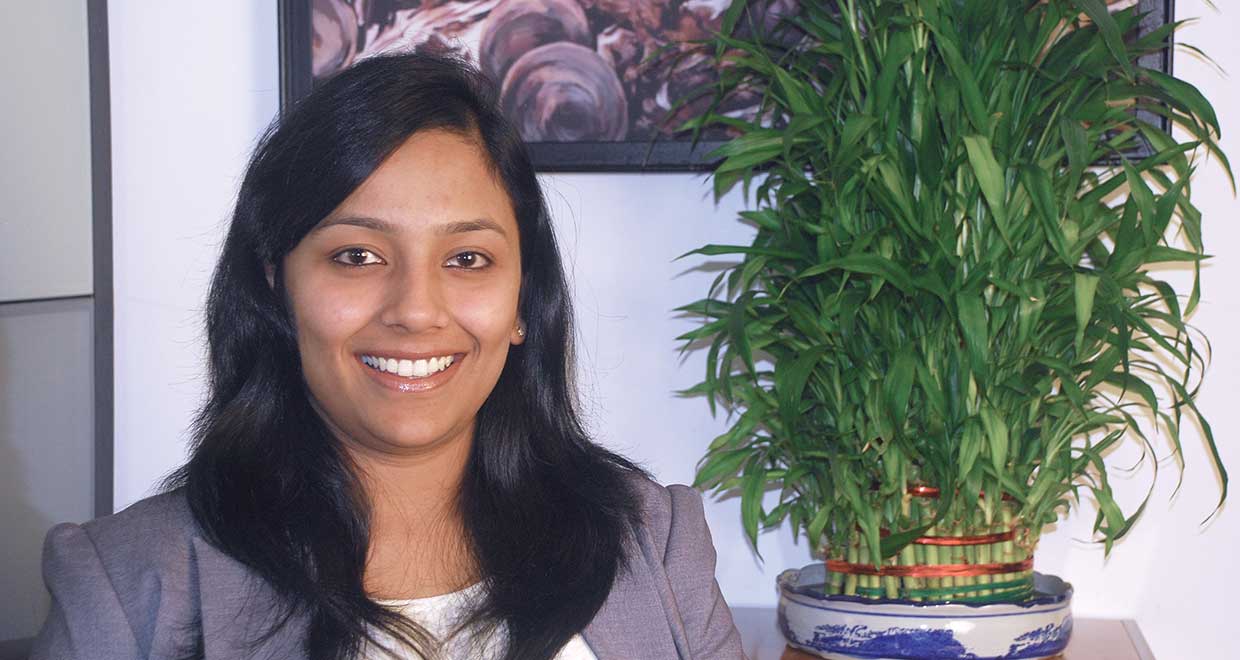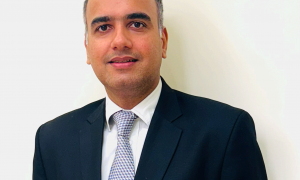Harshita graduated in law from Symbiosis International University, Pune, in 2009. She also holds a Diploma in Intellectual Property Law from World Intellectual Property Organization, and a Diploma in International Business Laws and Corporate Laws in India from Symbiosis. After a successful stint at Nishith Desai Associates, Mumbai, she is currently Vice President-Legal, at Nexus Venture Partners.
In this interview we speak to her about:
- Pursuing the BBA-LLB course
- Working at Nishith Desai Associates
- Her current role at Nexus Venture Partners
Given that most of our readers are law students, how would you introduce yourself to them?
On the professional front, I would like to introduce myself as a transaction lawyer with M&A/ PE/ VC experience of over eight years now. On a more personal front, I am a forward looking person who strongly believes in the motto “Aim high, achieve high”.
What motivated you to pursue a career in the legal field? How did the BBA LLB combination help you?
I would say I am a first generation lawyer from my father’s family, though my maternal grandfather was a Judicial Magistrate. I never had the privilege to see him around, but I grew up listening to his stories. His personalised stationery (ink pens with his name embedded on it, note pads, etc.) fascinated me as a child and inspired me to get into the profession (however, I could never own a single piece of personalised stationery even eight years into this profession!). The inspiration soon evaporated into thin air as I was growing up in a family full of engineers around me and my dad’s only vision in life seemed to see me crack the IITs. After getting out of school, I was not left with many choices but to appear for the engineering exams. As obvious as it could be, I did not come out with flying colours in any of those papers and right at that time I happened to learn about the new B.A.LLB course at NLSIU, Bengaluru, from an acquaintance. The curriculum and the course interested me enough and I decided to pursue my childhood passion.
I would say the BBA LLB combination gives you a better edge only if you are planning to build a career as a corporate lawyer/ in-house counsel since the curriculum gives you a fair insight into business subjects like accounts, corporate governance, principles of management, etc. apart from the regular law subjects.
Have you ever felt the NLU- non NLU divide?
I personally never felt the divide. In fact, I was fortunate enough to get an opportunity (purely based on merit) to intern with big firms like Nishith Desai Associates, Jyoti Sagar Associates, DSK Legal, Crawford Bayley etc., while I was at law school. Again, in terms of recruitment, I got a pre placement offer from NDA (basis my internship), so I don’t think the NLU- non NLU divide played any role in my career.
Having said that, I am not discounting the importance of making the right choice of institution. However, it is equally important for students to focus on their deliverables and behaviour during internships because ultimately if your work is good, no firm is going to say ‘no’ to you simply because you do not belong to a NLU.
Can you share some memorable experiences from you time at law school?
I think I have had the best time of my life at Symbiosis Law School. Having come for a small town, Pune was a fast pace life. Making friends from different parts of India, adjusting to the new city/ climate/ local culture, everything was a great experience.
Moots formed an integral part of my law school life. I participated as a speaker/ researcher in various national moot court competitions. I was a speaker at the SS Maniyar National Moot Court Competition, 2007 alongwith batchmates Adab Singh Kapoor and Amir Arsiwala, which incidentally happened to be the first national moot court competition that Symbiosis Law School ever won.
The moot courts are a great learning experience. They not only give an insight into the real court room proceedings by exposing you to different laws and their application to real life situations, (where you get to build your research capabilities and argumentative/ reasoning skills), they also help you understand and appreciate the importance of a team work.

You were a part of the Human Rights cell in law school. How did you contribute to the activities of this cell?
Being part of the HRC at law school helped me participate in various social welfare initiatives, be it educating street children, rehabilitation of the children of commercial sex workers or visit to old age homes. I think its important both as a student and as a professional that you contribute in some way or the other towards societal welfare and development. You must endeavour to give back to society.
Quoting my first mentor at work Nishith Desai in this context, he says, “As a professional, one-third your time and effort should be devoted towards generating income for yourself and the family, the other one-third should go into intellectual stimulation and development of your own being and the remaining one-third should be used for societal welfare and improvement.”
You hold diplomas in International Business Laws and Corporate Laws as well as in Intellectual Property law. Can you tell our readers about the nature and scope of these areas of law?
Though my diploma in IPR did not particularly help me in my career, primarily because I chose to be a transaction lawyer, my diploma in International Business Laws helped me understand the basics of foreign investment, different investment routes, cross border investment structures, etc. which gave me a good base to start off when I began my stint with NDA. A diploma course in addition to the law degree helps you to gain advanced knowledge in a specialised field of law.
How did you secure an appointment with Nishith Desai Associates?
Basis my internship with NDA, I got a pre-placement offer from the firm. I am not sure how it works now, but during our time, NDA only offered jobs to interns they liked working with. At NDA, they believe in a culture of creativity and discipline. If you are good at your work and they believe you are a culture fit, it is likely that you may get an offer.
What was the nature of your work at NDA?
I was a Senior Associate in the PE/ M&A team at NDA, where I largely focused on cross border transactions. NDA is known for its research oriented approach and the KM programme aided their belief in constant knowledge expansion. We used to have CE (Continuing Education) sessions everyday at 9 AM where we discussed and debated over legal developments, case studies, deal dissection (analyzing a deal from a legal, regulatory and tax perspective) etc. At NDA, each member had to contribute towards the KM programme, whether it is by way of writing articles/ research papers, conducting or participating in a CE. As part of the initiative, I co-authored several articles for leading national/international publications, attended and participated in conferences and of course there was no excuse to skip a CE session!
What caused you to shift from NDA to Nexus Ventures Partners?
Well, I moved to Nexus Venture Partners (NVP), because I saw an opportunity to get to the other side of the table and experience how the implementation of the law firm advise really works.
As VP Legal, I lead the venture capital investment transactions and assist in M&As and strategic partnerships, in India. I also oversee legal compliances for the portfolio companies and offer counsel to portfolio companies on a wide variety of legal issues ranging from corporate compliance to employment laws.
As a VP to a VC fund, I am expected to balance both the commercial and the legal aspects of a transaction. I have to manage the deal end to end, sometimes with or without support from external law firms. It becomes demanding more so when the portfolio companies also look up to you for assistance on day to day issues. As opposed to a law firm where you work for a particular team (be it corporate, IP, dispute resolution) as a fund counsel, you are the go-to person for any of these issues so this is more diversified a role in that sense.
Unlike a law firm, where you are seen as a revenue generator, as an in house you are more like an overhead expense for the fund house, so you have to constantly be on your toes and prove yourself to the company every day.

In your opinion, do India law schools prepare students for real world challenges?
I do not believe so because the real world of law is a lot different from what you perceive it when you are at law school. I think what really adds value to the laws school degree is your internships. So my advice to students has always been to concentrate on the internships and try to learn as much as you can from there. Please take your internships very seriously and trust me every bit of work that you do at your internship adds on to your knowledge and experience.
What advice do you have for our readers who are primarily college students?
I am staunch believer of the fact that your ranking from a top law school is not the best indicator of your success, instead its your passion and perseverance which will take you a long way in your career. And as they say, life is a path of snow, tread carefully because every move will show!

























